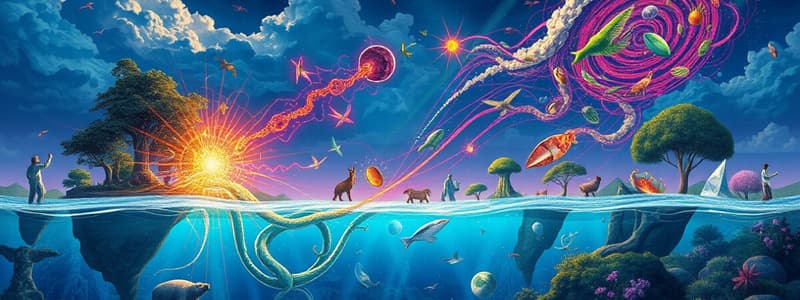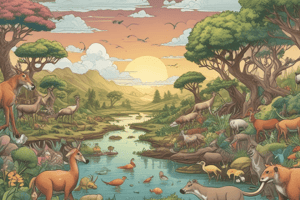Podcast
Questions and Answers
What is the main role of plants in an ecosystem?
What is the main role of plants in an ecosystem?
- To consume energy from the soil
- To convert light energy into chemical energy (correct)
- To provide shelter for animals
- To decompose organic matter
Which term describes the initial step in energy storage in an ecosystem?
Which term describes the initial step in energy storage in an ecosystem?
- Biomass accumulation
- Nutrient cycling
- Energy transfer
- Primary production (correct)
In a food web, what typically distinguishes secondary consumers?
In a food web, what typically distinguishes secondary consumers?
- They are exclusively herbivores.
- They are at the top of the food chain.
- They feed on producers only.
- They prey on primary consumers. (correct)
What is a characteristic of a food chain?
What is a characteristic of a food chain?
What type of food web is primarily composed of large plants and animals?
What type of food web is primarily composed of large plants and animals?
Which statement best describes consumers in an ecosystem?
Which statement best describes consumers in an ecosystem?
What is the highest level of consumers in a food chain commonly called?
What is the highest level of consumers in a food chain commonly called?
Which process is used by some organisms when light is absent?
Which process is used by some organisms when light is absent?
Flashcards are hidden until you start studying
Study Notes
Energy Flow in Ecosystems
- The sun is the ultimate energy source for the biosphere, providing energy in light and heat forms.
- Plants utilize sunlight through photosynthesis, leading to energy fixation termed primary production.
- Primary production represents the initial stage of energy storage in ecosystems, aiding in the creation of biomass.
Food Chain
- A food chain illustrates the linear path of energy and nutrient transfer among organisms.
- Primary producers (photoautotrophs) convert light energy into chemical energy, while chemoautotrophs utilize chemosynthesis in darkness.
- Energy stored by autotrophs is transferred to heterotrophs (consumers).
- Secondary consumers feed on primary consumers, forming multiple interconnected food chains.
Food Web
- Food webs represent complex interconnections, reflecting that consumers usually feed on multiple species rather than a single food source.
- The presence of various predators for each species highlights the intricate relationships within an ecosystem.
- Two primary types of food webs exist:
- Grazing Food Web: Comprises larger plants and animals commonly seen.
- Soil-based or Detritus Food Web: Involves organisms that feed on decomposed organic matter.
Energy Pyramid
- The energy pyramid visually represents energy levels available at different trophic levels in an ecosystem.
- Energy decreases significantly at each successive level, typically only about 10% is passed on from one level to the next.
Studying That Suits You
Use AI to generate personalized quizzes and flashcards to suit your learning preferences.



